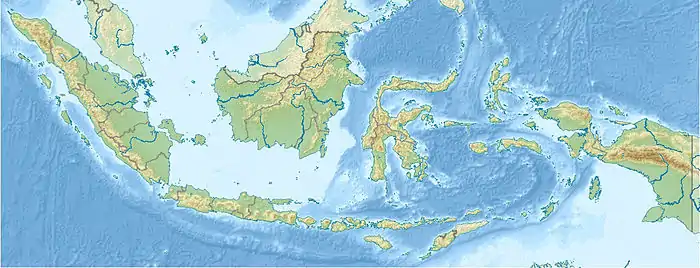Pokekea Megalithic Site
The Pokekea Megalithic Site is a megalithic archaeological site in the Lore Lindu National Park. It is located in the Behoa (Besoa) Valley northwest of Bada Valley. The Behoa valley is notable for its preserved kalambas, megaliths shaped like large cylindrical stone vats. The kalambas served as communal funerary urns and resemble in form and function the monuments on the Plain of Jars in Laos.
Situs Megalitik Pokekea | |
 Pokekea Megalithic Site  Pokekea Megalithic Site (Indonesia) | |
| Location | Poso Regency, Sulawesi, Indonesia |
|---|---|
| Region | Southeast Asia |
| Coordinates | 1°41′29.51″S 120°12′47.87″E |
| Type | Monument |
| History | |
| Material | stone |
| Periods | Iron Age |
At Pokekea there are 27 kalambas, together with decorated stone lids and statues (Indonesian: arcas). A kalamba at the park entrance is decorated by faces arranged in a strip along its outer wall. Their features are similar to the arcas in the Bada Valley. The lids next to the kalambas are also decorated, some with small protruding statues of monkeys and lizards around their edge.[1] Excavations at the site carried out in 2008 by Dwi Yuniawati have shown that kalambas served as family burial chambers containing a minimum of ten people. The kalambas probably did not house the remains of the entire tribe, but were reserved for the elite. The remains show traces of teeth mutilation and cremation.[2]
Analysis of two kalambas at Pokekea carried out in 2006 by Wiebke Kirleis, Valério Pillar and Hermann Behling suggest a date range between 766–898 and 1146–1272 AD.
Notes
- Steimer-Herbert 2016, p. 313.
- Steimer-Herbert 2016, p. 314.
References
- Steimer-Herbert, Tara; Besse, Marie (2016). "Indonesian Megaliths as the Result of the Interaction between Indigenous Peoples and Hindu-Buddhist Kingdoms". In Prasetyo, Bagyo; Nasiti, Titi Surti; Simanjuntak, Truman (eds.). Austronesian Diaspora: A New Perspective. Yogyakarta: Gadjah Mada University Press. pp. 301–315. ISBN 978-602-386-202-3.